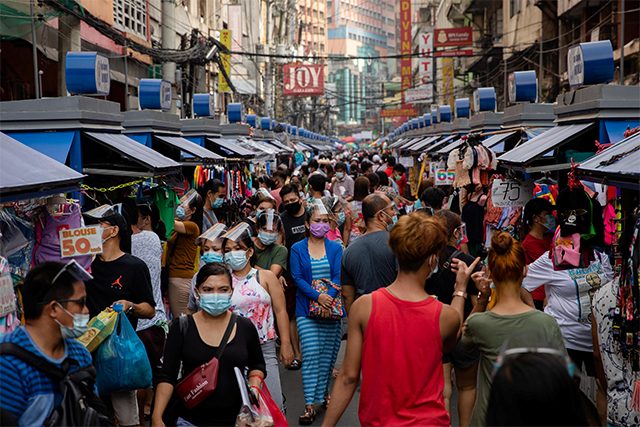
As several officials deny rumors of a supposed upcoming nationwide lockdown this holiday season, concerns on the possible surge of coronavirus disease cases continue to prevail among some Filipinos.
Columnist Manuel Quezon III on Sunday tweeted that people have been talking of a supposed potential “lockdown” in the National Capital Region from December 23 to January 3, 2021.
“Whether overheard in markets in Caloocan, in Manila, or in boardrooms, talk of a December 23 NCR lockdown isn’t going away,” he wrote.
Quezon then urged local reporters to have it checked and added that certain screenshots of an “advisory” have been circulating on “social media civic groups” which claims the following:
Attention:
Prepare for possible declaration of nationwide ECQ (enhanced community quarantine) starting Dec. 23, 2020 – Jan. 3, 2021 as IATF (Inter-Agency Task Force) preemptive measures to prevent possible increase of COVID-19 cases during Holiday Season. For your info. Please disseminate to your respective area/chapter.
ECQ is the strictest quarantine scenario imposed by the government wherein public transportation is prohibited and very few sectors like health care and food production and distribution can operate.
“Won’t reporters look into this? Speculation it’s to discourage holiday travel, but it has both ordinary folks and business types antsy,” Quezon wrote before.
On the same day, a number of government officials denied the claims and asked the public to refrain from sharing false information in the middle of a pandemic.
Quezon later on updated his tweet and informed his followers that the rumors have been dismissed.
Some replies in his Twitter thread consisted of other similar stories where social media users claimed of hearing it in public markets and groceries, among others.
Presidential spokesman Harry Roque, also the spokesperson of the Inter-Agency Task Force for the Management of Emerging Infectious Diseases, called the messages “fake news” and said that there are no changes to the quarantine classifications announced by the chief executive for December.
Metro Manila and other regions are placed under general community quarantine until December 31, while the rest of the country are under its more lenient version, modified GCQ.
Meanwhile, Cabinet Secretary Karlo Nograles urged Filipinos to act responsibly amid a pandemic.
“Know the truth. Do not spread fake news especially during this time. Let us continue to be responsible to ourselves and to our families,” he said.
Restituto Padilla, spokesperson of National Task Force Against COVID-19, likewise reminded the public to always verify the information that they receive.
“Let us not be instruments of fake news distribution,” he said.
Health Undersecretary Maria Rosario Vergeire on December 2 said that the government could be forced to impose a strict lockdown after Christmas season if COVID-19 cases overwhelm the country’s healthcare system.
But she added that there are “still no discussions” about it.
No to surge
Meanwhile, as officials debunk the lockdown rumors, some Filipinos shared that they are in favor of the re-imposition ECQ to reduce the potential surge of COVID-19 cases after the holidays.
“Parang better na ECQ talaga at these times? Sa’kin lan naman hahahaha para maiwasan na (mag)-surge sa cases. Onting tiis na lang guys, magkaka-vaccine na,” a Twitter user wrote in response to the Palace dismissing the claims.
“Para makaiwas sa possibleng paglobo ng COVID-19 cases ngayong holiday, willing naman kami sumunod pero sana mag-advise sila (nang) maaga kung matutuloy ‘to para makapaghanda ang lahat ‘di ba, hindi ‘yung bibiglain na naman ang mga tao,” another online user commented.
“IMO (in my opinion) I’d rather have a nationwide lockdown on Dec. 23 to Jan. 3 than welcoming 2021 with 5K (5,000) cases! TBH (to be honest) people are unstoppable going out without proper measures,” wrote a different Filipino.
Last month, mathematics professor Guido David from the OCTA Research Group warned of a possible surge in the country’s COVID-19 cases as more people may likely go out and mingle this Holiday season.
The group, composed of academic experts from the University of the Philippines and the University of Santo Tomas, has projected that the number of cases may reach between 470,000 and 500,000 by the end of the month.
It also appealed for the public to refrain from joining or organizing social gatherings during the holidays.
“There is evidence from Europe and North America that increased social mixing among households is driving the second wave of COVID-19 in these parts of the world,” part of a group’s recent report read.
“Family gatherings should be limited in size and should be celebrated outside to mitigate transmission,” it added.
David said that when the Philippines reaches the 500,000-mark of nationwide cases, it would mean that the “(epidemic) curve is already unflattening and we’re starting on an upward trend” anew.
Last week, Health Secretary Francisco Duque III and Manila Mayor Isko Moreno inspected Divisoria in Manila after photos of shoppers overcrowding the area went viral on social media.
Divisoria is a popular shopping destination among Filipinos who especially like to bargain hunt. It sells almost everything from food to clothes.
Meanwhile, to have a safe holiday celebration, the Department of Health issued a circular listing down activities that are considered to be of high-risk, medium-risk and low-risk in terms of potentially contracting the virus.
RELATED: Here’s what celebrating Christmas 2020 could look like, according to medical experts
Attending online masses, having video calls with families instead of gatherings and online Christmas shopping are listed as safe activities.
On the other hand, holding small gatherings outside one’s homes or in public areas that consider physical distancing protocols and the limitations on the number of attendees in mass gatherings are considered a moderate-risk activity.
These are encouraged to be conducted within less than 15 minutes to further prevent COVID-19 transmission.
Maximum people allowed in gatherings under GCQ are ten individuals, while the maximum number allowed in modified GCQ can be up to 50 persons.
High-risk activities include attending indoor religious activities with many attendees, singing, speaking loudly, having physical contact, shopping in crowded malls and flea markets and holding large gatherings in buildings, among others.
Officials encourage everyone to constantly practice minimum health protocols such as the wearing of face masks and face shields and frequent handwashing to minimize the risk of contracting the virus.









